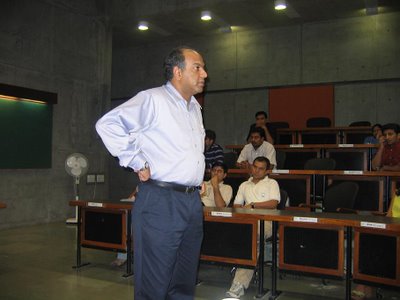Thursday, November 30, 2006
Monday, November 27, 2006
Walmart ready to enter india?
About three months ago, I had a debate with a friend at IIMA that walmart will enter India with a partnership model. At that time i had considered Bharti as a contender for the partner i guess i was right. The other option i thought walmart could enter India with a franchisee model.
The mode of entry was also the way i had thought they would do ...
do all the back end stuff and let the partner do the front end ...
The reason is India's FDI policy, it allows only FDI in retail that sells it's own brand such as Nokia, Motorola, Samsung, Sony. But policy does not allow FDI in retail where it's a multi brand store.
official reason for such as policy
it'll jeopardize the interest of small vendors...
But rumors are that it's lobbying by Biyani and the retail group who wants to get as "tagda" as possible before the inevitable happens.
So inevitable is about to happen ...
Reliance v/s Bharti-Walmart v/s Biyani v/s Star bazaar (Tata)
I'm surprised that Tata is not doing anything in this area .. who know what's cooking there ?
link to article on WSJ
Wednesday, November 22, 2006
Tuesday, November 21, 2006
Entrepreneurship lessons from Sanjeev Bhikhchandani

- keep trying, success never comes easy and it’s never ever quick
- use your experience to your advantage
- Perseverance pays
- Nothing wrong in being opportunist at times
- Do the math … V IMP…
- you can not sail in two boats …
The Freemium Business Model
- Jarid Lukin
Monday, November 20, 2006
The billionaire next door?
Yes I came home early for the show. Luckily, traffic has not been bad and I was here in 15 minutes. So the time well spent. An hour of time watching who is WB? What’s WB’s philosophy and what’s his success secret.
Rule # 1 don’t loose the money, #2 don’t forget the rule #1., #3 do what you know? And don’t do you what you don’t. That’s what he describes his success.
link to his interview snippet
Thursday, November 16, 2006
At a Tie event in Bay area
The event was structured in three parts 1. networking 2. panel discussions and 3. Q&A. It was fun meeting folks at the networking, ofcourse some of the folks were really snobbish and some were just too good. I met few people one British embassy associate wanting to invite companies to setup offices in UK, A Chinese lady wanting to find clients, An American executive wanting to grow his company, an India sales manager hanging out, few entrepreneurs wanting to find opportunity and of course few vellas like me who just came to find whats happening.
Dinner was aweful, after eating food in India for six or so months, I don’t think I can eat India food anywhere in North America. It just does not compare in quality forget the cost. I’m side tracking …
So the panel started the discussion. Rob Owens, Vice President and Senior Research Analyst, Pacific Crest, was the moderator. He was the first one on the street to make the security as a group, an industry and cover it differently in 1997. Since than, he has covered the industry and considered an authority. The panel was Don canning, a sr. fellow from Microsoft’s emerging business team, Ashsih Chandna from greylock partners, Stephnie Fohn, CEO whitehat securities – a managed outsourcing company and Praveen jain EVP Mcafee.
Some of the key points from discussions were
The industry is not saturated in terms of $$ the expected size is $120 billion and current industry size is $20 billion
The industry does not have many big players
The industry has seen few segments mature that are firewall and anti-virus.
The industry does not have common standards and in the game theatric situation of not having one specially every one having MS and CISCO big brother in bed together
The industry has not seen an ipo in last five years but trend may change with ipo for 3 to 5 players
Mr. Praveen’s opinion was that the smaller company should not stay small, they should merge (hostile nature of big boys).
Question answers were boaring for me hence I came back.. Overall time well spent than watching TV/documentary


